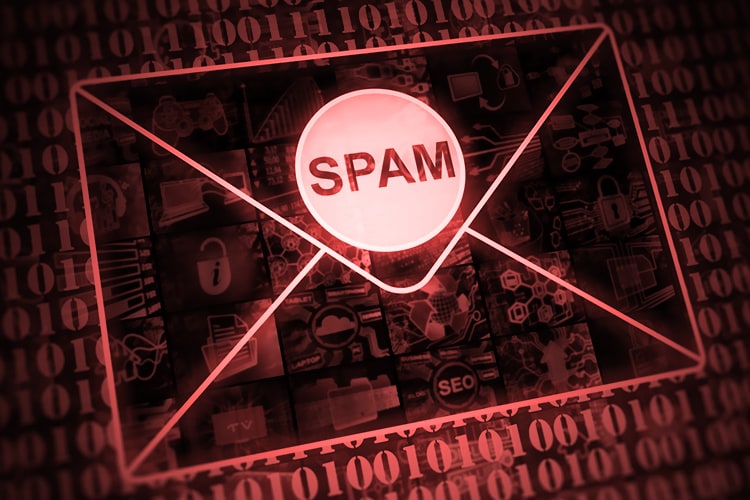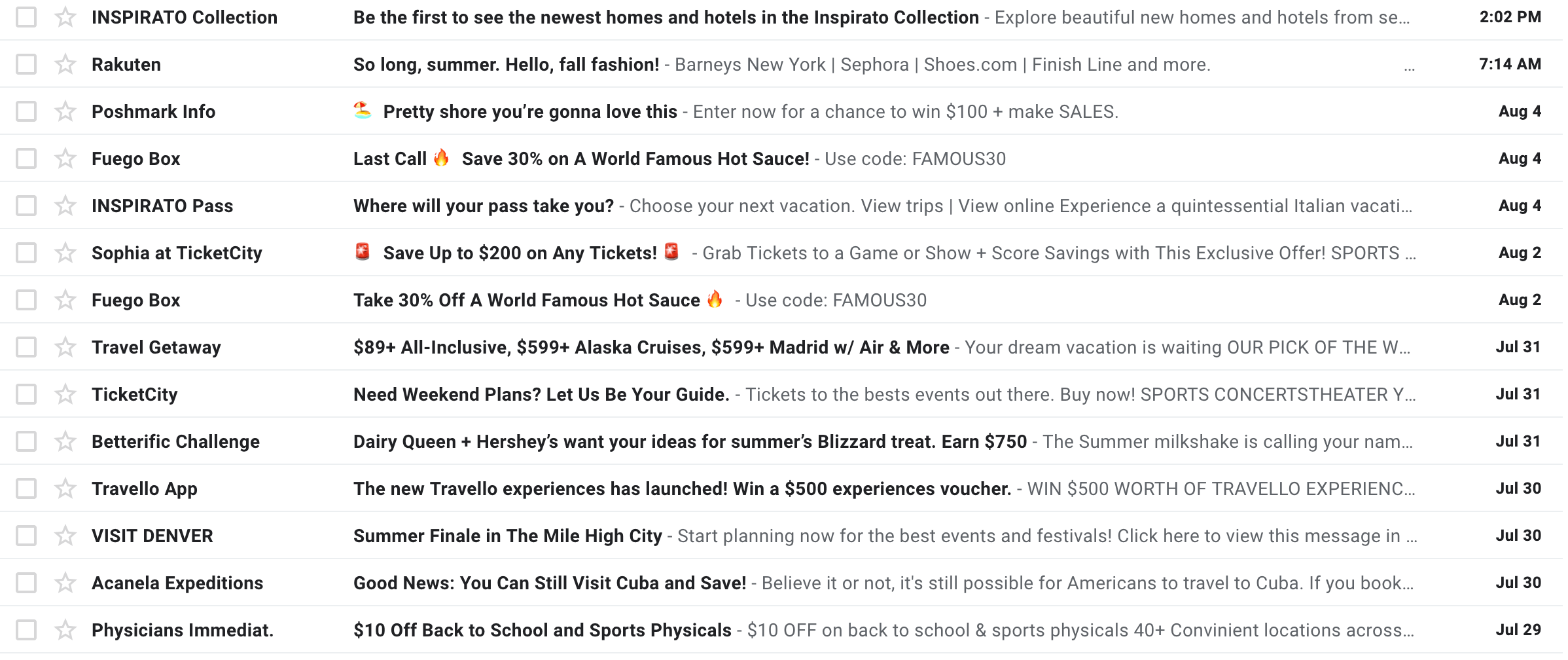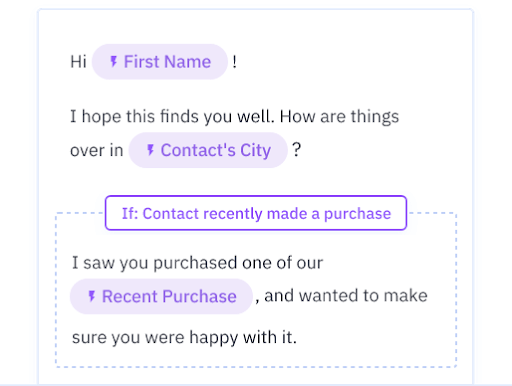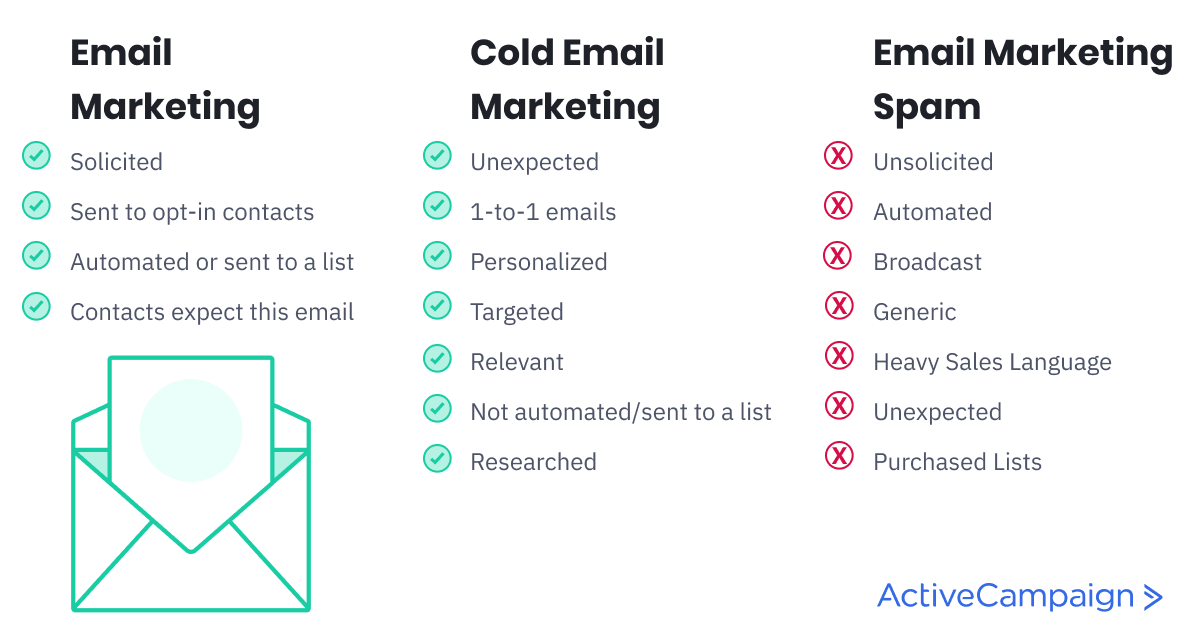188 Spam Words to Avoid in Emails

Every email marketer’s worst nightmare: the spam folder. Nearly one in five emails gets caught by a spam filter and sent to the spam folder.
Spam filters check for red flags like:
- The use of certain words
- Links to sketchy websites
- Messages in ALL CAPS
- Colorful and different sized fonts
- Broken HTML code
- Emails without an unsubscribe button
In this article, we’re focusing on that first one: the use of certain words and phrases, aka spam trigger words. Keep reading to learn:
- What are spam trigger words?
- 188 spam words and phrases to avoid
- 6 deliverability tips to stay out of the spam folder
What are spam trigger words?
Spam trigger words are keywords or phrases that email providers see as red flags. You’ll often find these words in emails that people mark as spam. As the saying goes, “if it sounds too good to be true, it probably is.” Spam filters catch suspicious words and phrases associated with:
- Scams
- Gimmicks
- Schemes
- Promises
- Free gifts

Gmail’s spam filter caught all of these promotional emails. Now they’re left to languish in my spam folder for eternity. (Or until Gmail automatically deletes them after 30 days.)
An important note before we share the list of words: Context matters.
Spam filters have become more advanced in recent years. They won’t automatically send you to spam for saying “limited time” or “get started now” — if you’re using those words responsibly.
If you…
- Stuff a ton of spam keywords into your email
- Use all caps, bright red font, and lots of exclamation points
- Already have a low delivery rate
…you’re going to be in trouble.
If you…
- Use one or two of the words and phrases in context
- Code your emails well
- Have a low bounce rate
…you’ll be fine.
188 spam words and phrases to avoid in your email marketing
With all of the above in mind, here’s the list of spam words.
Avoid spam words that make exaggerated claims and promises
- #1
- 100% more
- 100% free
- 100% satisfied
- Additional income
- Be your own boss
- Best price
- Big bucks
- Billion
- Cash bonus
- Cents on the dollar
- Consolidate debt
- Double your cash
- Double your income
- Earn extra cash
- Earn money
- Eliminate bad credit
- Extra cash
- Extra income
- Expect to earn
- Fast cash
- Financial freedom
- Free access
- Free consultation
- Free gift
- Free hosting
- Free info
- Free investment
- Free membership
- Free money
- Free preview
- Free quote
- Free trial
- Full refund
- Get out of debt
- Get paid
- Giveaway
- Guaranteed
- Increase sales
- Increase traffic
- Incredible deal
- Lower rates
- Lowest price
- Make money
- Million dollars
- Miracle
- Money back
- Once in a lifetime
- One time
- Pennies a day
- Potential earnings
- Prize
- Promise
- Pure profit
- Risk-free
- Satisfaction guaranteed
- Save big money
- Save up to
- Special promotion
Avoid spam words that create unnecessary urgency and pressure
- Act now
- Apply now
- Become a member
- Call now
- Click below
- Click here
- Get it now
- Do it today
- Don’t delete
- Exclusive deal
- Get started now
- Important information regarding
- Information you requested
- Instant
- Limited time
- New customers only
- Order now
- Please read
- See for yourself
- Sign up free
- Take action
- This won’t last
- Urgent
- What are you waiting for?
- While supplies last
- Will not believe your eyes
- Winner
- Winning
- You are a winner
- You have been selected
Avoid spam words that look like shady, spammy, or unethical behavior
- Bulk email
- Buy direct
- Cancel at any time
- Check or money order
- Congratulations
- Confidentiality
- Cures
- Dear friend
- Direct email
- Direct marketing
- Hidden charges
- Human growth hormone
- Internet marketing
- Lose weight
- Mass email
- Meet singles
- Multi-level marketing
- No catch
- No cost
- No credit check
- No fees
- No gimmick
- No hidden costs
- No hidden fees
- No interest
- No investment
- No obligation
- No purchase necessary
- No questions asked
- No strings attached
- Not junk
- Notspam
- Obligation
- Passwords
- Requires initial investment
- Social security number
- This isn’t a scam
- This isn’t junk
- This isn’t spam
- Undisclosed
- Unsecured credit
- Unsecured debt
- Unsolicited
- Valium
- Viagra
- Vicodin
- We hate spam
- Weight loss
- Xanax
Avoid spam words that are jargon or legalese (and everything else)
- Accept credit cards
- Ad
- All new
- As seen on
- Bargain
- Beneficiary
- Billing
- Bonus
- Cards accepted
- Cash
- Certified
- Cheap
- Claims
- Clearance
- Compare rates
- Credit card offers
- Deal
- Debt
- Discount
- Fantastic
- In accordance with laws
- Income
- Investment
- Join millions
- Lifetime
- Loans
- Luxury
- Marketing solution
- Message contains
- Mortgage rates
- Name brand
- Offer
- Online marketing
- Opt in
- Pre-approved
- Quote
- Rates
- Refinance
- Removal
- Reserves the right
- Score
- Search engine
- Sent in compliance
- Subject to…
- Terms and conditions
- Trial
- Unlimited
- Warranty
- Web traffic
- Work from home
Six deliverability tips to stay out of the spam folder
Here are more strategies for improving email deliverability and making it into your subscribers’ inboxes.
1. Run a spam check
Spam checkers scan your email content to check for… well… spamminess.
ActiveCampaign runs a Spam Check on every campaign and automation email you create. Our Spam Check tool scans the content of your message and gives you a list of issues that triggered at least one rule for “spamminess.”
Because email content can be nuanced — especially when it comes to spam words — Spam Check won’t stop you from sending your email. Plus, Spam Check only scans the content of your message. It doesn’t know anything about the reputation of your domain or the makeup of your list.
2. Practice good email list hygiene
Good email hygiene means regularly cleaning out inactive email subscribers.
How does good list hygiene help your deliverability?
- If you have a lot of unengaged subscribers, your open rates will be lower
- Your open rates and engagement rates affect your sender reputation
- Your sender reputation affects your deliverability
- Low deliverability means your emails could be marked as spam — no spam words necessary
Once you remove unengaged subscribers, keep your remaining list engaged (and your deliverability high) with consistent, high-quality campaigns.
How can you clean your email list?
- Use engagement automations to track who opens your messages (and who ignores them)
- When a contact hasn’t engaged for 60 days (or the time period that makes sense for you), trigger a “last chance” engagement email
- Remove contacts who don’t interact with the “last chance” email campaign
3. Don’t break the law
The CAN-SPAM Act governs commercial email, aka any email sent by a business trying to promote or sell a product or service.
The rules of CAN-SPAM:
- Don’t use false or misleading information
- Don’t use a deceptive subject line
- Tell subscribers where you’re located
- Give subscribers a simple way to opt out of your emails
- Honor all opt-outs quickly
Penalties for not following the law can add up to $16,000 per email, so it’s important to follow the rules. To learn more about the CAN-SPAM Act, visit the Federal Trade Commission website.
4. Consider a double opt-in
To stay un-spammy, only send emails to people who give consent to receive your campaigns. Double opt-in requires new subscribers to verify their email address, so they can’t give you a fake one.
A typical double opt-in process looks like this:
- A potential subscriber visits your website
- A form on your website offers a lead magnet in exchange for their email address
- After your new subscriber gives you their email address, they get a confirmation email
- If they confirm their email address, they get their lead magnet – and have officially gone through double opt-in
This helps lower your bounce rate and keep your delivery rates high.
5. Make your emails more engaging
The more people who open and engage with your email campaign, the better your sender reputation and deliverability. Two quick tips for creating more engaging emails:
- Write better subject lines. (If you need some help, check out our subject line generator.)
- Use segmentation and dynamic content. Serving up different messaging to different recipients can get more contacts to engage with your emails.

80% of consumers are more likely to make a purchase when brands offer personalized experiences. Here’s how dynamic content personalizes your emails.
6. Be smart about your cold email marketing
Cold email marketing promotes your business, product, or service to someone that you don’t have an existing relationship with.
People who receive your email marketing expect your emails because they have opted in. No one signs up to receive cold emails, so you need to make sure your cold email marketing is:
- Targeted
- Personalized
- Relevant
- 1-to-1

This is the difference between cold email marketing and email marketing spam.
Unlike typical email marketing to opted-in contacts, you can’t blast cold emails to a list of prospects. If you do, you’re not sending cold emails. You’re sending spam.
Conclusion: Spam words and avoiding spam filters
You’re not sending spam on purpose. I trust you. But a spam filter can still snatch your email before it can land in your subscriber’s inbox.
Here’s a recap of spam words and phrases to use with caution:
- Words that make exaggerated claims and promises
- Words that create unnecessary urgency and pressure
- Words that look like shady, spammy, or unethical behavior
- Words that are jargon or legalese
Avoid spam words and keep your deliverability high with the tips in this post, and you’ll be well on your way to steering clear of spam filters.
Source: Active Campaign